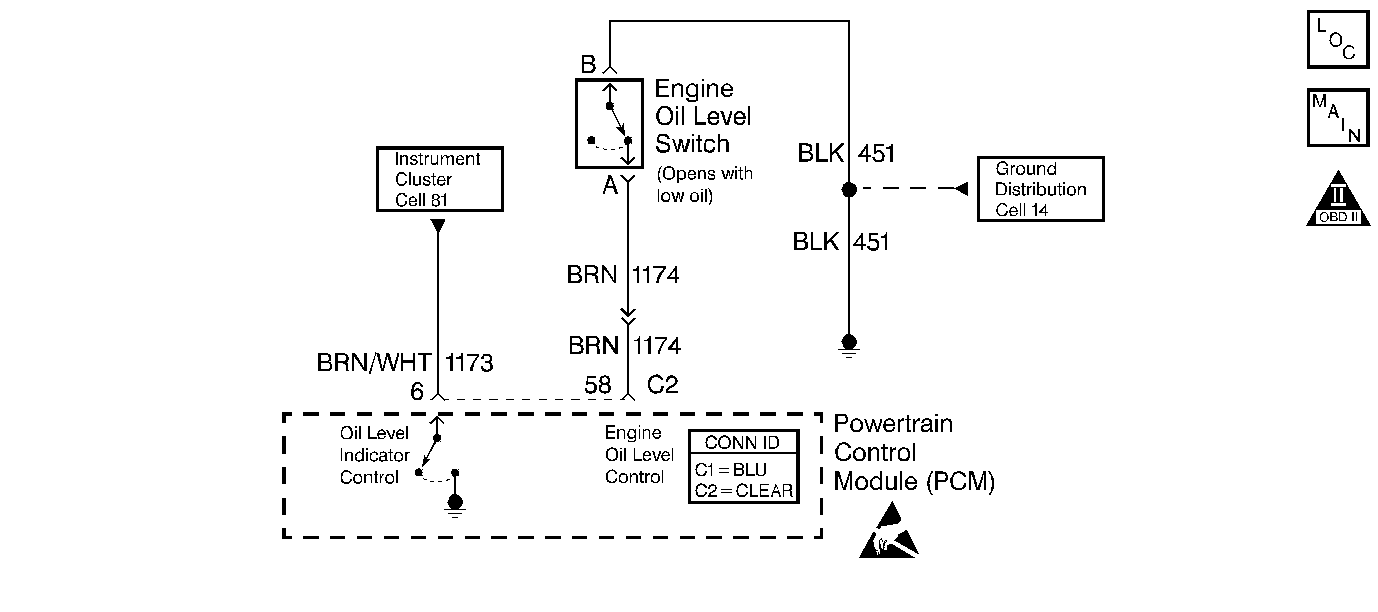
Circuit Description
The engine oil level switch is a simple float switch that is grounded when the engine oil level is OK. The PCM checks the engine oil level switch circuit at startup. Before checking the state of the engine oil level switch, the PCM performs a test routine based on time and engine coolant temperature to ensure that the engine oil has drained back into the sump. To test for low oil level at startup, one of the following conditions must be present:
| • | If the engine coolant temperature was between 15°C (59°F) and 130°C (266°F) at the last key OFF. The engine coolant temperature at key ON must be at least 12°C (22°F) cooler than the engine coolant temperature at the last key OFF. |
| • | If the engine coolant temperature was higher than 82°C (150°F) at the last key OFF, the time between last key OFF and the present key ON must be sufficient to allow the oil to drain back to the sump. The PCM will remain powered up for 10 seconds to ensure that the oil has drained back to the sump. If the key is turned back ON while the PCM is still powered up, the oil level will not be tested. |
The low oil level lamp will be illuminated for approximately 7 minutes when the PCM checks for low oil level and the engine oil level switch indicates that a low oil level condition exists (engine oil level switch circuit is not grounded). When the ignition is first turned ON, the PCM commands the low oil level lamp ON for a brief period of time in order to test the bulb.
Diagnostic Aids
For diagnosis of the instrument panel, refer to Instrument Cluster System Check .
Check for the following conditions:
| • | Poor connection at PCM or oil level sensor. |
| Inspect harness connectors for backed out terminals, improper mating, broken locks, improperly formed or damaged terminals, and poor terminal to wire connection. |
| • | Damaged harness. |
| Inspect the wiring harness for damage. If the harness appears to be OK, disconnect the PCM and turn the ignition ON. Observe a voltmeter connected to the affected PCM output circuit while moving connectors and wiring harnesses related to the PCM output circuit. A change in voltage will indicate the location of the fault. |
| • | Engine Oil Level Switch circuit. |
| If the problem with the Low Oil Level lamp can not be isolated using the Engine Oil Level Switch Diagnostic table, refer to Powertrain Control Module Controlled Warning Lamps Diagnosis . |
Test Description
Number(s) below refer to the step number(s) on the Diagnostic Table.
-
This vehicle is equipped with a PCM which utilizes an Electrically Erasable Programmable Read Only Memory (EEPROM). When the PCM is being replaced, the new PCM must be programmed.
-
For the PCM to check engine oil level, startup engine coolant temperature must be at least 12° C (22° F) cooler than the engine coolant temperature was last time the ignition was turned OFF. Allowing the engine to warm and then cool ensures that the PCM checks the engine oil level switch and that the information displayed on the scan tool is current.
Step | Action | Value(s) | Yes | No |
|---|---|---|---|---|
1 |
Important: Ensure that engine oil level is not low (as indicated on engine oil level indicator) before continuing diagnosis. Was the Powertrain On-Board Diagnostic (OBD) System Check performed? | -- | ||
2 | Observe Engine Oil Level displayed on the scan tool. Does Engine Oil Level display OK? | -- | Go to Powertrain Control Module Controlled Warning Lamps Diagnosis | |
3 |
Is the test lamp ON? | -- | ||
4 |
Caution: To avoid any vehicle damage, serious personal injury or death when major components are removed from the vehicle and the vehicle is supported by a hoist, support the vehicle with jack stands at the opposite end from which the components are being removed and strap the vehicle to the hoist. Does the DMM display voltage near the specified value? | B+ | ||
5 | Connect the J 39200 DMM between the oil level indicator control and the engine oil level control in order to measure voltage between the engine oil level switch signal circuit and chassis ground. Does the DMM display a voltage near the specified value? | B+ | ||
6 |
Did you find a problem? | -- | Go to Diagnostic Aids | |
7 |
Did you find a problem? | -- | ||
8 |
Did you find a problem? | -- | ||
9 | Locate and repair open in the engine oil level switch ground circuit (CKT 451). Refer to Wiring Repairs . Is the action complete? | -- | -- | |
10 | Replace the engine oil level switch. Refer to Engine Oil Level Sensor and/or Switch Replacement . Is the action complete? | -- | -- | |
|
Important:: The replacement PCM must be programmed. Refer to Powertrain Control Module Replacement/Programming . Replace the PCM. Is the action complete? | -- | -- | ||
Does the Engine Oil Level display OK? | -- | System OK |
